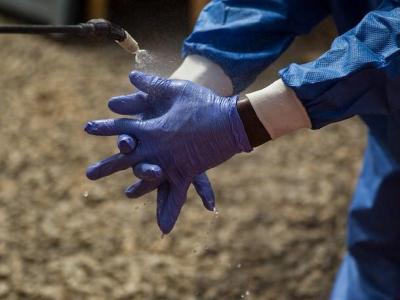May 11, 2007 (CIDRAP News) – The city of Edmonton, Alta., recently announced that it was stockpiling an herbal supplement in the hope of boosting the immunity of police, firefighters, and other essential workers during an influenza pandemic.
By buying a ginseng product from CV Technologies, Inc., a company based in Edmonton, the city has become the first in North America to add an herbal supplement to its pandemic stockpile, according to media reports.
The supplement, COLD-fX, is a proprietary extract of North American ginseng that contains what the company calls unique polysaccharide components. It is Canada's top-selling over-the-counter cold and flu remedy, according to an Apr 23 company press release. Warren Michaels, CV Technologies' vice president of media relations, told CIDRAP News the company launched COLD-fX in the United States in October 2006 and that sales have been modest.
City says decision took time
Bob Black, Edmonton's director of emergency preparedness, said in the CV Technologies press release that COLD-fX is another tool the city can use for pandemic preparedness. "There are so many unknowns in planning for a possible pandemic that anything we can do to be prepared makes sense," he said. "We need to take every reasonable precaution to help our emergency personnel stay on the job, so they can help others."
The stockpile will be used to treat 5,000 key city employees, such as police, firefighters, paramedics, and waste disposal workers. It consists of 600,000 pills, an 8-week supply, according to an Apr 25 report by the Toronto Globe and Mail.
CV Technologies, which pitched the stockpiling idea to Edmonton's pandemic planners, said it would split the $250,000 cost of the program with the city as part of the company's social responsibility program. Black told CIDRAP News that the agreement stipulates that Edmonton will pay $30,000 up front to secure access to a stockpile of COLD-fX and will be required to pay its remaining share only if and when the city needs the remedy in a pandemic setting.
The product has a 5-year shelf life, but the company said it would make sure the city has access to a fresh supply regardless of when it uses the stockpile.
Jacqueline Shan, PhD, DSc, CV Technologies' chief executive officer and chief scientific officer, said that in a pandemic, "COLD-fX may help provide additional protection to front line workers by enhancing their immune systems" until an effective vaccine becomes available.
Black said the city spent more than a year considering if it should stockpile COLD-fX. Senior officials and an epidemiologist from the city's occupational health and safety office were involved in the discussions. "It wasn't a spur-of-the-moment decision. On the balance, it seemed like a prudent thing to do" he said.
Emergency preparedness officials are faced with tough questions about whether workers, particularly those in health and public safety jobs, like paramedics, firefighters, and police, will come to work during a pandemic, Black said. Having an herbal remedy on hand that might boost immunity could potentially make employees feel more confident about showing up for work, he said.
Canadian health officials may have a heightened sensitivity about protecting workers during a public health emergency because of their experience with SARS (severe acute respiratory syndrome) in 2003, Black said. A final report on the outbreak that was issued in January faulted hospital officials for not doing more to protect their workers; nine hospital workers in Toronto contracted SARS while caring for critically ill patients.
Studies suggest possible benefits
Some randomized, double-blind, placebo-controlled studies have suggested that COLD-fX can help people reduce their number of colds and the duration and severity of symptoms.
Two controlled trials were described in one report in the January 2004 issue of the Journal of the American Geriatrics Society. The researchers evaluated the effect of COLD-fX on the number of laboratory-confirmed acute respiratory illnesses in 198 nursing home and assisted-living residents (average ages, 83.5 and 81) in the 2000 and 2000-01 flu seasons.
Ninety percent of the subjects had received the influenza vaccine. Half received a 200-mg COLD-fX tablet twice a day, while the others received placebo tablets.
Investigators found that more people in the placebo group (9 of 101 subjects) than in the treatment group (1 of 97 subjects) were diagnosed with flu or respiratory syncytial virus. They calculated that the overall risk was reduced by 89% in the treatment group and concluded that COLD-fX was a safe, well-tolerated, and potentially effective treatment for preventing acute respiratory illnesses.
During the 2003-04 cold and flu season, another research group, headed by Gerald N. Predy of the regional public health agency based in Edmonton, studied whether the ginseng supplement could prevent colds in a group of 323 Edmonton adults aged 18 to 85 who had not received seasonal flu vaccination. Their findings appeared in the October 2005 issue of the Canadian Medical Association Journal (CMAJ).
The volunteers, who had a history of at least two colds the previous season, randomly received two COLD-fX capsules or a placebo daily for 4 months. Colds were verified by a symptom scoring system and graded on a 4-point severity scale.
Researchers found that those who took COLD-fX had fewer colds and the colds they did have were milder and less persistent. The authors concluded that the treatment appeared to reduce the number of recurrent colds by almost 13%, the severity of colds by 15.4%, and the average duration of colds by 2.4 days.
In a commentary published in the same issue of CMAJ, Ronald B. Turner, MD, professor of pediatrics at the University of Virginia School of Medicine in Charlottesville, wrote that problems with natural remedy studies typically include a lack of information about the active ingredients they contain, lack of a clear understanding of the mechanism of action, and lot-to-lot variability in the products. However, he said the COLD-fX was standardized to reduce such variability.
Turner wrote that it was not clear how the effects of North American ginseng relate to viral respiratory infections. "Enhancement of interferon-gamma activity might be expected to reduce the severity of symptoms, but enhancement of the elaboration of inflammatory cytokines might be expected to increase the severity," he wrote.
Few rigorous, reproducible studies have shown either conventional or alternative cold treatments to be beneficial, Turner wrote. Further studies involving well-characterized and standardized ginseng preparations were needed to confirm the results of the CMAJ study, he stated.
Public health experts weigh in
Paula Steib, communications director for the Association of State and Territorial Health Officials (ASTHO) in Washington, DC, told CIDRAP News in an e-mail that it's not surprising to see a metropolitan area like Edmonton stockpile a natural remedy. Canada, along with Australia, Britain, and other European countries, has a long tradition of using homeopathic and herbal remedies, which are available in pharmacies and often prescribed by physicians, she said.
"The situation is very different in the US where most homeopathic and herbal remedies are scoffed at by the medical establishment," Steib said. "ASTHO is unaware of any state that is stockpiling remedies that are not part of the CDC's strategic national stockpile program."
Jeffrey Duchin, MD, chief of communicable disease control for Seattle King County Public Health in Washington, said Edmonton's plan to stockpile COLD-fX for its essential employees sounded interesting, but he said it was unclear from the studies whether the remedy would be of value.
"It appears safe and inexpensive, but it shows how little else people feel they have to turn to," he said.
Communities that consider adding an alternative remedy to their stockpiles should weigh the costs and benefits, Duchin said. If they have met other stockpiling needs, such as having adequate supplies of oseltamivir (Tamiflu) and personal protective equipment, and still have money left in their pandemic preparedness budgets, then it might be reasonable to consider adding something extra, he said.
Black said the city has increased its supplies of personal protective equipment and other items its employees would need and noted that other public health functions, including stockpiling vaccines and antivirals, are handled by the province and its health authorities.
NIH says ginseng may have potential
The CMAJ study caught the attention of the US National Institutes of Health (NIH), which in September 2006 included it in its annual bibliography of significant advances in dietary supplement research. "These findings suggest that North American ginseng may be an attractive natural prophylactic for upper respiratory tract infections," the NIH said. "Additional studies are needed to confirm these findings."
In January, the Nutrition Action Health Letter, a publication of the Center for Science in the Public Interest, a health advocacy group, included COLD-fX in a review of eight popular over-the-counter cold remedies. The publication said that more studies are needed to confirm that COLD-fX can shorten or prevent colds or flu. "Even so, COLD-fX is the only remedy we found with any evidence that it might improve your chances of getting through the cold and flu season without coming down with something," the article said.
Michaels said CV Technologies doesn't want to overstate COLD-fX's potential in a pandemic situation, but he said the company believes the product has merit and is a legitimate candidate for incorporation into pandemic plans.
The company is exploring the possibility of applying for US Food and Drug Administration approval to market COLD-fX specifically as a preventive for colds and is conducting a phase 3 clinical trial for that purpose. The company also recently launched a trial to see if COLD-fX improves the immunity of healthcare workers and is investigating the precise biochemical pathways by which the product affects the immune system, according to information on the company's Web site.
See also:
McElhaney JE, Gravenstein S, Cole SK, et al. A placebo controlled trial of a proprietary extract of North American ginseng (CVT-E002) to prevent acute respiratory illness in institutionalized older adults. J Am Geriatr Soc 2004 Jan;52(1):13-9 [Abstract]
Predy GN, Goel V, Lovlin R, et al. Efficacy of an extract of North American ginseng containing poly-furanosyl-pyranosyl-saccharides for preventing upper respiratory tract infections: a randomized controlled trial. CMAJ 2005 Oct;173(9):1043-8 [Full text]
Turner B. Studies of "natural" remedies for the common cold: pitfalls and pratfalls. (Commentary) CMAJ 2005 Oct 25;173(9):1051-2 [Full text]
CV Technologies news release
SARS Commission final report
http://www.ontla.on.ca/library/repository/mon/16000/268478.pdf
NIH press release
http://www.nih.gov/news/pr/sep2006/od-21.htm
NIH bibliographies of dietary supplement research advances
http://ods.od.nih.gov/Research/Annual_Bibliographies.aspx
Schardt D. Un-catching colds: do popular remedies work? Nutrition Action Healthletter 2007 Jan/Feb;8-11 [Full text]



















